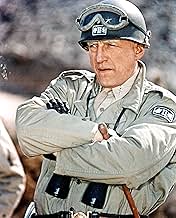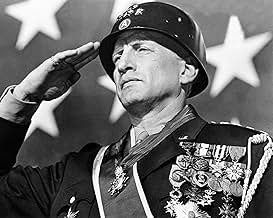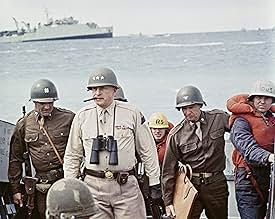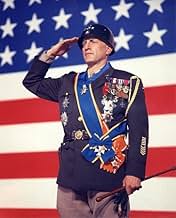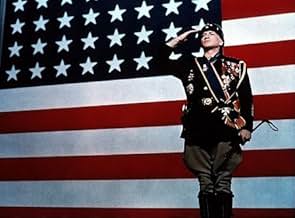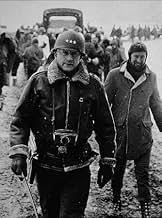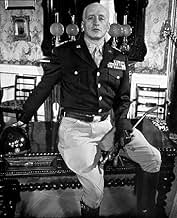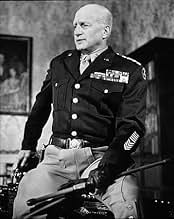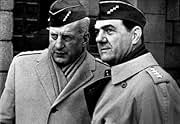Patton
- 1970
- Tous publics
- 2h 52min
La phase de la Seconde Guerre mondiale de la carrière du général américain controversé George S. Patton.La phase de la Seconde Guerre mondiale de la carrière du général américain controversé George S. Patton.La phase de la Seconde Guerre mondiale de la carrière du général américain controversé George S. Patton.
- Réalisation
- Scénario
- Casting principal
- Récompensé par 7 Oscars
- 25 victoires et 8 nominations au total
Carey Loftin
- General Bradley's Driver
- (as Cary Loftin)
Pat Zurica
- First Lieutenant Alexander Stiller
- (as Patrick J. Zurica)
Richard Münch
- Colonel General Alfred Jodl
- (as Richard Muench)
Résumé
Reviewers say 'Patton' is acclaimed for George C. Scott's compelling performance as General George S. Patton, highlighting his complexity. The film is lauded for its epic scope, Franklin J. Schaffner's direction, and powerful war sequences. However, some critics find it lacking in secondary character development and note its lengthy runtime. Historical accuracy is debated, with concerns over anachronisms and creative liberties. Despite these issues, 'Patton' is recognized as a pivotal war film, offering profound insights into leadership and the intricacies of war.
Avis à la une
RELEASED IN 1970 and directed by Franklin J. Schaffner, "Patton" stars George C. Scott as the charismatic general during his WWII campaigns in North Africa and Sicily, as well as France & Germany following the Normandy invasion. After the invasion of Sicily, Patton was reprimanded for slapping a cowardly soldier suffering battle fatigue (in real life it was two soldiers on separate occasions in the course of eight days in August, 1943). The fiery general was removed from command for eleven months while his junior in age and rank, Omar Bradley (Karl Malden), was selected to command the First United States Army for the invasion of Normandy.
Meanwhile, Patton was assigned to London as a decoy to deceive the Germans in a sham operation called Fortitude. The ruse was successful because the German High Command respected Patton more than any other Allied commander and deemed him crucial to any plan to invade mainland Europe. Immediately following the successful invasion, he was put in command of the Third Army in the final Allied thrust against Germany where the headstrong general, once again, proved his mettle as his forces favored speed and aggressive offensive action.
Patton was an interesting character who maintained a flashy larger-than-life image in order to encourage his troops; and he didn't hesitate to get his hands dirty with them. While other officers tried to blend-in with the troops on the battlefield, Patton brazenly displayed his rank insignia. He was a romantic who valued bravery and tenacity above all. All this is effectively conveyed in this ambitious war flick. It's interesting to observe the North African and European theaters of the war from the standpoint of the Allied generals, mostly Patton and Bradley, rather than the typical perspective of the infantry.
THE FILM WAS WRITTEN by Francis Ford Coppola with additional material from Edmund H. North (based on the factual accounts of Ladislas Farago & Omar N. Bradley). It runs 172 minutes and was shot in Spain, Algeria, Morocco, Crete and England, with the opening speech filmed at Bob Hope Patriotic Hall in Los Angeles.
GRADE: A-
Meanwhile, Patton was assigned to London as a decoy to deceive the Germans in a sham operation called Fortitude. The ruse was successful because the German High Command respected Patton more than any other Allied commander and deemed him crucial to any plan to invade mainland Europe. Immediately following the successful invasion, he was put in command of the Third Army in the final Allied thrust against Germany where the headstrong general, once again, proved his mettle as his forces favored speed and aggressive offensive action.
Patton was an interesting character who maintained a flashy larger-than-life image in order to encourage his troops; and he didn't hesitate to get his hands dirty with them. While other officers tried to blend-in with the troops on the battlefield, Patton brazenly displayed his rank insignia. He was a romantic who valued bravery and tenacity above all. All this is effectively conveyed in this ambitious war flick. It's interesting to observe the North African and European theaters of the war from the standpoint of the Allied generals, mostly Patton and Bradley, rather than the typical perspective of the infantry.
THE FILM WAS WRITTEN by Francis Ford Coppola with additional material from Edmund H. North (based on the factual accounts of Ladislas Farago & Omar N. Bradley). It runs 172 minutes and was shot in Spain, Algeria, Morocco, Crete and England, with the opening speech filmed at Bob Hope Patriotic Hall in Los Angeles.
GRADE: A-
It's a splendidly done movie. Scott's performance is powerful. He does everything but reach out, grab you by the shirt, and shout in your face. Karl Malden is likable and full of common sense, but he is the only person in the movie whom we can grasp as a character -- except for Scott himself. Scott is as good at his job as Patton was, and in fact the quality of his performance is less volatile than Patton's own, with virtually no weak spots.
That's part of the problem. Patton himself. I suppose that like most people he had a "good" side -- loving family, played with his dog, collected stamps and whatnot. But as good and aggressive a general as he was, he wasn't a particularly likable guy. It's easy to demand that everyone in your command have shoes as shiny as yours -- especially when you've got some black PFC doing your shining for you.
The movie is noticeably slanted. Patton's weakness, like Coriolanus's, is ambition. Sometimes it's played for laughs. He carried the stars of a Lieutenant General around with him until word of his promotion comes down, then immediately has them pinned on. But only three times is his meanness illustrated without tongue in cheek. (1) During a conversation with Bradley he reveals that he's disobeyed orders by sending his army on a mission to beat Montgomery in taking Sicily. He calls the attack "a reconnaissance in force". He receives an order to get his troops back where they belong and tells his aide to send the message back because it's garbled. "A simple old soldier," Bradly comments disapprovingly. (2) He orders General Truscott to stage some amphibious landings which will help him take Messina before Montgomery. Truscott complains that they're not prepared to do that without heavy casualties. Patton lies down and threatens to fire Truscott and get someone else to do the job. (3) While visiting a hospital and presenting the wounded with decorations he comes across a soldier whose nerves are shot and who is weeping, and Patton slaps him twice and sends him back to the front.
His mean streak went beyond those incidents. He used to practice his arrogant, threatening scowl in front of the mirror. Whether or not it improved the GI's morale to wear neckties in combat is, at best, arguable. (What would Patton make of the Israeli army?) But the simple historical fact is that the movie pitches even these "mean" incidents at the audience like softballs. He didn't just slap a soldier who was feeling sorry for himself, which is the picture the film presents. He slapped two soldiers on separate occasions, one suffering from combat fatigue (which is no joke) and the other from malaria and other illnesses. Patton also enjoyed an intimate relationship with his niece, a Red Cross donut girl, who accompanied him in England and France, much to his wife's displeasure.
Those slapping incidents cost Patton a bit in the way of professional esteem but it didn't cost any lives. And it didn't cause him any remorse. Even in his "apology," he claims he was trying to "shame a coward." What DID cost lives was Patton's cobbling together a small task force to liberate a POW camp in Germany shortly before the war's end, when such a dangerous move was no longer necessary. "Task Force Baum" was recognized by its leaders for the lost cause it was, a plunge deep into enemy territory without any backup. There were 53 vehicles and 294 men. All the vehicles were destroyed or captured. Twenty-five of the men were killed, 32 wounded, and almost all the rest captured. The purpose of the mission, it was tacitly agreed, was to rescue Patton's son-in-law.
His fitful harshness towards his troops is usually justified in the movie, even if it looks excessive. The soldier-slapping scene is preceded by one in which Patton kneels in the hospital, whispers something to a soldier whose face is covered by bandages, and lovingly places a medal on his chest. Next thing he encounters: Tim Considine, fully dressed, sitting up, and sobbing with self pity. Earlier, when Patton asks a cook why he's not wearing sidearms, the cook laughs genially and replies, "Sidearms? Why, hell, General, I'm a cook!" I missed the part where cooks learn to laugh in the face of orders from a general, but it gives Patton a chance to tear everybody a new one.
Everyone paid for Patton's ambition and vanity, even those not under his command. The gasoline and other supplies he diverted to his own forces during the run through France helped him alright, but they were also needed elsewhere.
The movie's subtitle is "Salute to a Rebel." Very stylish for 1970 audiences, but the material is presented in such a way as to leave us with a lingering admiration for Patton's genius and bullheadedness. What kind of "rebel" was he? He was more of an authoritarian Arschloch than anybody else in his greater vicinity.
What the writers, the director, and George C. Scott have given us, to paraphrase someone else, is not a warts-and-all portrait but the suggestion that there is something heroic about a wart.
I gave the movie high marks because it's as well done as it is -- disregarding its relationship to Patton himself. I didn't mind so much that the wrong tanks were used and that the production could only find two Heinkel 111s in flying condition. The location shooting is great, the cinematography crisp and unimpeachable, the score one of Goldsmith's best, and Scott's performance deserved whatever awards it got.
That's part of the problem. Patton himself. I suppose that like most people he had a "good" side -- loving family, played with his dog, collected stamps and whatnot. But as good and aggressive a general as he was, he wasn't a particularly likable guy. It's easy to demand that everyone in your command have shoes as shiny as yours -- especially when you've got some black PFC doing your shining for you.
The movie is noticeably slanted. Patton's weakness, like Coriolanus's, is ambition. Sometimes it's played for laughs. He carried the stars of a Lieutenant General around with him until word of his promotion comes down, then immediately has them pinned on. But only three times is his meanness illustrated without tongue in cheek. (1) During a conversation with Bradley he reveals that he's disobeyed orders by sending his army on a mission to beat Montgomery in taking Sicily. He calls the attack "a reconnaissance in force". He receives an order to get his troops back where they belong and tells his aide to send the message back because it's garbled. "A simple old soldier," Bradly comments disapprovingly. (2) He orders General Truscott to stage some amphibious landings which will help him take Messina before Montgomery. Truscott complains that they're not prepared to do that without heavy casualties. Patton lies down and threatens to fire Truscott and get someone else to do the job. (3) While visiting a hospital and presenting the wounded with decorations he comes across a soldier whose nerves are shot and who is weeping, and Patton slaps him twice and sends him back to the front.
His mean streak went beyond those incidents. He used to practice his arrogant, threatening scowl in front of the mirror. Whether or not it improved the GI's morale to wear neckties in combat is, at best, arguable. (What would Patton make of the Israeli army?) But the simple historical fact is that the movie pitches even these "mean" incidents at the audience like softballs. He didn't just slap a soldier who was feeling sorry for himself, which is the picture the film presents. He slapped two soldiers on separate occasions, one suffering from combat fatigue (which is no joke) and the other from malaria and other illnesses. Patton also enjoyed an intimate relationship with his niece, a Red Cross donut girl, who accompanied him in England and France, much to his wife's displeasure.
Those slapping incidents cost Patton a bit in the way of professional esteem but it didn't cost any lives. And it didn't cause him any remorse. Even in his "apology," he claims he was trying to "shame a coward." What DID cost lives was Patton's cobbling together a small task force to liberate a POW camp in Germany shortly before the war's end, when such a dangerous move was no longer necessary. "Task Force Baum" was recognized by its leaders for the lost cause it was, a plunge deep into enemy territory without any backup. There were 53 vehicles and 294 men. All the vehicles were destroyed or captured. Twenty-five of the men were killed, 32 wounded, and almost all the rest captured. The purpose of the mission, it was tacitly agreed, was to rescue Patton's son-in-law.
His fitful harshness towards his troops is usually justified in the movie, even if it looks excessive. The soldier-slapping scene is preceded by one in which Patton kneels in the hospital, whispers something to a soldier whose face is covered by bandages, and lovingly places a medal on his chest. Next thing he encounters: Tim Considine, fully dressed, sitting up, and sobbing with self pity. Earlier, when Patton asks a cook why he's not wearing sidearms, the cook laughs genially and replies, "Sidearms? Why, hell, General, I'm a cook!" I missed the part where cooks learn to laugh in the face of orders from a general, but it gives Patton a chance to tear everybody a new one.
Everyone paid for Patton's ambition and vanity, even those not under his command. The gasoline and other supplies he diverted to his own forces during the run through France helped him alright, but they were also needed elsewhere.
The movie's subtitle is "Salute to a Rebel." Very stylish for 1970 audiences, but the material is presented in such a way as to leave us with a lingering admiration for Patton's genius and bullheadedness. What kind of "rebel" was he? He was more of an authoritarian Arschloch than anybody else in his greater vicinity.
What the writers, the director, and George C. Scott have given us, to paraphrase someone else, is not a warts-and-all portrait but the suggestion that there is something heroic about a wart.
I gave the movie high marks because it's as well done as it is -- disregarding its relationship to Patton himself. I didn't mind so much that the wrong tanks were used and that the production could only find two Heinkel 111s in flying condition. The location shooting is great, the cinematography crisp and unimpeachable, the score one of Goldsmith's best, and Scott's performance deserved whatever awards it got.
A few years ago, I had the pleasure of reading "The Patton Papers," a collection of Gen. Patton's diary entries and letters edited by Martin Blumenson. Having seen the movie, I think that no actor has ever better captured the spirit of a man better than George C. Scott, nor has any movie better portrayed that spirit than PATTON.
Patton was a man who lived for war. World War II was the high point and culmination of his life. He didn't fight for any principles, he didn't fight to defend freedom or democracy or any abstract idea; he fought because he loved fighting. In his diaries you can read of his fear of flunking out of West Point; the prospect terrified him because he was certain that he would never be good at anything except being a general or a leader of a country.
As a leader of men, he was exceptional. His speech at the beginning of the movie is vintage Patton, an almost exact reproduction of a speech Patton actually gave to Third Army. It's tough, and no-nonsense; Patton lets you know in no uncertain terms that he is here to win, to destroy the enemy, and by God you'd better be too. I don't know if Patton actually directed traffic on the roads as he is shown doing in the movie, but it was a very Pattonish thing to do. Patton did on at least one occasion get out of his staff car and join a squad of G.I.'s in heaving a vehicle out of the mud. Try to imagine Montgomery doing that; the very thought is hilarious!
Patton's character explains his treatment of his men. To those who had been wounded fighting for him he was always kind and considerate. But to those whose minds could not stand the horrible strain that war imposed on them, he was merciless; he could not comprehend the fact that other people didn't share his love of violence for violence' sake. PATTON shows this aspect of his character very well.
Karl Malden's Omar Bradley is shown in an almost father-like role; he sees and recognizes Patton's immense talents as a general, and uses them in spite of Patton's natural ability to antagonize everybody around him. Not shown in the movie is Patton's unloveable characteristic of turning on his subordinates once they surpassed him in their careers. Patton had nothing but good to say about Bradley, until Bradley was promoted over Patton's head, whereupon Patton savaged Bradley in his diary. Patton did the same to Eisenhower.
A general can have no higher compliment than the fear and respect of his adversaries, and as PATTON demonstrates, Patton was more feared by the Germans than any other Allied general, at least on the Western front. As one German officer observes all too prophetically, "the absence of war will destroy him [Patton]." And although mankind's single greatest stroke of good fortune in the 20th century was that Russia and America never came to blows, it is still hard not to feel sorry for Patton as he desperately seeks his superiors' approval to carry the war on eastward into the Soviet Union - anything, just to have a war to fight. Patton is like an addict to a destructive drug.
Hollywood has rarely given us such a textured and human portrait of a great man: cruel, often foolish in his relations with others, rude, and psychopathically attached to violence, but brave, dedicated, and loyal. Certainly those who, like myself, have Jewish blood, or who were otherwise marked for death by the Nazi state, all owe him a great debt of gratitude for his pivotal role in destroying that state. And yet, had he been born German, Patton would surely have fought just as devotedly for the Nazi side. I'm glad he wasn't.
Rating: **** out of ****.
Patton was a man who lived for war. World War II was the high point and culmination of his life. He didn't fight for any principles, he didn't fight to defend freedom or democracy or any abstract idea; he fought because he loved fighting. In his diaries you can read of his fear of flunking out of West Point; the prospect terrified him because he was certain that he would never be good at anything except being a general or a leader of a country.
As a leader of men, he was exceptional. His speech at the beginning of the movie is vintage Patton, an almost exact reproduction of a speech Patton actually gave to Third Army. It's tough, and no-nonsense; Patton lets you know in no uncertain terms that he is here to win, to destroy the enemy, and by God you'd better be too. I don't know if Patton actually directed traffic on the roads as he is shown doing in the movie, but it was a very Pattonish thing to do. Patton did on at least one occasion get out of his staff car and join a squad of G.I.'s in heaving a vehicle out of the mud. Try to imagine Montgomery doing that; the very thought is hilarious!
Patton's character explains his treatment of his men. To those who had been wounded fighting for him he was always kind and considerate. But to those whose minds could not stand the horrible strain that war imposed on them, he was merciless; he could not comprehend the fact that other people didn't share his love of violence for violence' sake. PATTON shows this aspect of his character very well.
Karl Malden's Omar Bradley is shown in an almost father-like role; he sees and recognizes Patton's immense talents as a general, and uses them in spite of Patton's natural ability to antagonize everybody around him. Not shown in the movie is Patton's unloveable characteristic of turning on his subordinates once they surpassed him in their careers. Patton had nothing but good to say about Bradley, until Bradley was promoted over Patton's head, whereupon Patton savaged Bradley in his diary. Patton did the same to Eisenhower.
A general can have no higher compliment than the fear and respect of his adversaries, and as PATTON demonstrates, Patton was more feared by the Germans than any other Allied general, at least on the Western front. As one German officer observes all too prophetically, "the absence of war will destroy him [Patton]." And although mankind's single greatest stroke of good fortune in the 20th century was that Russia and America never came to blows, it is still hard not to feel sorry for Patton as he desperately seeks his superiors' approval to carry the war on eastward into the Soviet Union - anything, just to have a war to fight. Patton is like an addict to a destructive drug.
Hollywood has rarely given us such a textured and human portrait of a great man: cruel, often foolish in his relations with others, rude, and psychopathically attached to violence, but brave, dedicated, and loyal. Certainly those who, like myself, have Jewish blood, or who were otherwise marked for death by the Nazi state, all owe him a great debt of gratitude for his pivotal role in destroying that state. And yet, had he been born German, Patton would surely have fought just as devotedly for the Nazi side. I'm glad he wasn't.
Rating: **** out of ****.
My only complaint with this film is several of the battle scenes play way too long. The first one in N. Africa, especially, is tension-less muddle. Due to the narrative focus on the affairs of the generals the battles are not very good and after are hard to follow. This is exceedingly minor in context because of not only the fog of war but history is what history is. I mention this because despite this issue I rather like this film, despite Patton (the man) being a brute and authoritarian. He was not a 20th century man. That says more about him than the 20th century.
The screenplay is, easily, the best part of the film. By the use of sarcasm and pointed barbs the film manages to place Patton the man in the proper context and despite Patton the man being pro-war make an anti-war film; it is really a very clever piece of writing that allows both hawks and doves to be really engaged with the storyline (which largely handles the history well). Best of all, this use of irony and sarcasm allows the film to show Patton as a complex, paradoxical and hypocritical figure. Patton the man loved the smell of battle but couldn't understand why fine young men had to die in war. He is a man who read his Bible every goddamn day. It is a sight to behold the mess and contradictions Patton lived by. And the screenplay effortlessly keeps the viewer orientated of what is happening in the war.
Scott is of course tailored made for the role and he gives his best career performance. Malden is also really engaging. The technical aspects give the film its proper weight. This is an exemplar of what a biopic can be.
The screenplay is, easily, the best part of the film. By the use of sarcasm and pointed barbs the film manages to place Patton the man in the proper context and despite Patton the man being pro-war make an anti-war film; it is really a very clever piece of writing that allows both hawks and doves to be really engaged with the storyline (which largely handles the history well). Best of all, this use of irony and sarcasm allows the film to show Patton as a complex, paradoxical and hypocritical figure. Patton the man loved the smell of battle but couldn't understand why fine young men had to die in war. He is a man who read his Bible every goddamn day. It is a sight to behold the mess and contradictions Patton lived by. And the screenplay effortlessly keeps the viewer orientated of what is happening in the war.
Scott is of course tailored made for the role and he gives his best career performance. Malden is also really engaging. The technical aspects give the film its proper weight. This is an exemplar of what a biopic can be.
PATTON was truly a shock to the system when it was released. The United States was still in the thick of the Vietnam war, and the country was extremely polarized between the hawks and the doves. Then along comes Patton, with a portrayal of a rebellious General who was always being put in his place by the establishment - even though he was, of course, a major establishment figure (generals aren't usually the most liberal or progressive types). Eisenhower (unseen) and the media are portrayed as unsympathetic to the maverick Patton, who is so single-minded in his determination to defeat the Germans you have to root for him, despite his boorish behavior.
And that is why Patton works - you have an unambiguous war against and unambiguous evil - Nazi Germany. Whereas Vietnam might have been a tough conflict for even its supporters to explain, World War Two was quite simple - we were the good guys, and they WERE the bad guys. And so you COULD root for the US Army and Patton without feeling a tinge of guilt.
Also superb in the film is everyman Karl Malden as General Omar Bradley, providing the stable and workmanlike leader (and one who rises quicker in the ranks due to it) to Patton's egomaniac.
And Yes, George C. Scott delivers a career-defining performance that is one for the books. Could Brando or Telly Savalas have pulled off the role as well? I don't think so - it was just tailor made for Scott.
And that is why Patton works - you have an unambiguous war against and unambiguous evil - Nazi Germany. Whereas Vietnam might have been a tough conflict for even its supporters to explain, World War Two was quite simple - we were the good guys, and they WERE the bad guys. And so you COULD root for the US Army and Patton without feeling a tinge of guilt.
Also superb in the film is everyman Karl Malden as General Omar Bradley, providing the stable and workmanlike leader (and one who rises quicker in the ranks due to it) to Patton's egomaniac.
And Yes, George C. Scott delivers a career-defining performance that is one for the books. Could Brando or Telly Savalas have pulled off the role as well? I don't think so - it was just tailor made for Scott.
Oscars Best Picture Winners, Ranked
Oscars Best Picture Winners, Ranked
See the complete list of Oscars Best Picture winners, ranked by IMDb ratings.
Le saviez-vous
- AnecdotesThe movie begins without showing the 20th Century-Fox logo, or any other indication that the film is starting. At military bases across the US theater owners reported that soldiers in the audience would often stand up and snap to attention when they heard the movie's opening line ("Ten-hut!"), assuming it to be a real call to attention.
- GaffesContrary to the way it's portrayed in the film, the controversy over George S. Patton's Knutsford speech was not over his having insulted the Russians (in fact, the Army quickly revised the initial transcript of his remarks to reflect that he had mentioned them). It had to do with his talk of "ruling the world" after the war - members of Congress said he had no business as a general commenting on post-war political affairs, while others objected to the notion of the US, Britain or anyone else "ruling the world."
- Crédits fousOne of the very, very few Twentieth Century-Fox films in which that company's logo is not shown at all, beginning or end. The film simply begins with the opening speech, and the opening Fox logo is replaced with an in-credit text-only notice after the speech. However, recent television showings have added the logo (not on DVD prints), and the addition is obviously spliced in from another piece of film.
- Versions alternativesThe Italian version is approximately 20 minutes shorter and removes all scenes set in the German Military HQ and/or showing German officers: although the credits still include the names of German performers, like Karl Michael Vogler as Marshall Rommel, their characters never appear onscreen in the Italian release.
- ConnexionsEdited into Opération Cobra (1972)
- Bandes originalesTo the Colors
(uncredited)
Traditional bugle call used in lieu of the National Anthem. Played at the opening scene.
Meilleurs choix
Connectez-vous pour évaluer et suivre la liste de favoris afin de recevoir des recommandations personnalisées
Détails
- Date de sortie
- Pays d’origine
- Site officiel
- Langues
- Aussi connu sous le nom de
- Patton: A Salute to a Rebel
- Lieux de tournage
- Cabo de Gata, Almería, Andalucía, Espagne(desert scenes)
- Société de production
- Voir plus de crédits d'entreprise sur IMDbPro
Box-office
- Budget
- 12 000 000 $US (estimé)
- Montant brut aux États-Unis et au Canada
- 61 749 765 $US
- Montant brut mondial
- 61 749 765 $US
- Durée2 heures 52 minutes
- Couleur
- Rapport de forme
- 2.20 : 1
Contribuer à cette page
Suggérer une modification ou ajouter du contenu manquant



